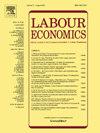Does a flexible parental leave system stimulate maternal employment?
IF 2.6
2区 经济学
Q2 ECONOMICS
引用次数: 0
Abstract
While many women stop working for an extended period after the birth of a child, well-designed parental leave policies can incentivize mothers to return to the labor market sooner. This study examines the effect of two recent parental leave reforms in Austria that allow parents to choose leave schemes with varying duration. Using a regression discontinuity design, we find that the introduction of more flexible scheme choices led mothers to take, on average, 1–2 months less of leave. This decrease in leave duration, however, was not accompanied by an employment increase of similar magnitude. To understand the absence of labor supply effects, we examine data on work preferences from the Austrian Microcensus. Child care duties are cited as the primary reason for not seeking work but few mothers indicate that they would start working if better access to formal childcare were available. Switching to the more flexible leave system had a minimal effect on the labor market choices of mothers, as the majority continue to prioritize child care responsibilities and do not consider nurseries as a desirable alternative. Our findings suggest that policy efforts to shorten parental leave may not be effective in the presence of strong family norms.
弹性产假制度会否刺激产妇就业?
虽然许多女性在生完孩子后会停止工作很长一段时间,但精心设计的育儿假政策可以激励母亲们早日重返劳动力市场。本研究考察了奥地利最近两项产假改革的影响,这两项改革允许父母选择不同期限的产假计划。使用回归不连续设计,我们发现引入更灵活的计划选择导致母亲平均少休1-2个月的假。然而,休假时间的减少并没有带来同样规模的就业增长。为了理解劳动力供给效应的缺失,我们检查了奥地利微观人口普查的工作偏好数据。照顾孩子的责任被认为是不找工作的主要原因,但很少有母亲表示,如果有更好的正规托儿服务,她们会开始工作。转向更灵活的休假制度对母亲在劳动力市场的选择影响最小,因为大多数人仍然优先考虑照顾孩子的责任,不认为托儿所是一个理想的选择。我们的研究结果表明,在强有力的家庭规范存在的情况下,缩短育儿假的政策努力可能不会有效。
本文章由计算机程序翻译,如有差异,请以英文原文为准。
求助全文
约1分钟内获得全文
求助全文
来源期刊

Labour Economics
ECONOMICS-
CiteScore
3.60
自引率
8.30%
发文量
142
期刊介绍:
Labour Economics is devoted to publishing research in the field of labour economics both on the microeconomic and on the macroeconomic level, in a balanced mix of theory, empirical testing and policy applications. It gives due recognition to analysis and explanation of institutional arrangements of national labour markets and the impact of these institutions on labour market outcomes.
 求助内容:
求助内容: 应助结果提醒方式:
应助结果提醒方式:


